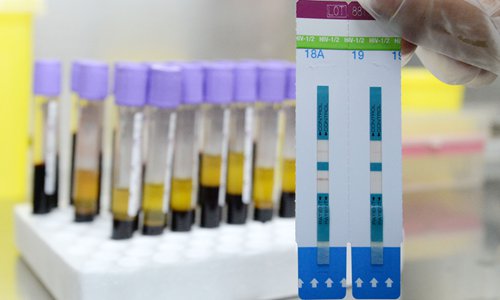HOME >> CHINA
Chinese HIV carriers eye cheaper drugs in Thailand, India
By Deng Xiaoci Source:Global Times Published: 2019/6/13 22:28:40

A laboratory technician conducts HIV tests at the Disease Control and Prevention Center of Handan, North China's Hebei Province, on November 30, 2018. Photo: VCG
Certain group of people living with HIV in China reportedly look to countries like Thailand and India for cheaper medicines with fewer side effects, or through sales agents, after they found few channels to buy the latest AIDS medicines.
They would regularly visit those countries, and even Africa, or through an agent, to purchase anti-AIDS drugs which are cheaper than in China, said sales agent Cheng Shuaishuai, who is now involved in AIDS counseling and drug sales business.
Those countries, including India and Thailand, have the latest drugs, such as Tivicay and Triumeq, at lower prices because they are the generic versions, the Beijing News reported on Thursday.
However, for patients in China, accessing such medicines is not easy.
The country has been speeding up the inclusion of such medicines in the medical insurance. For example, China provides patients anti-virus medicines for free, but the list has not been updated since 2007; its health insurance has covered several new anti-AIDS drugs, such as Rilpivirine, since 2017, which lowers the prices from 1,200 yuan ($173) per box to 100 yuan after reimbursement - almost as low as the prices in Thailand.
However, only some patients living with HIV are qualified to receive free drugs and some drugs have strong side effects. The latest medicines are not included in the free list nor covered by medical insurance.
The price of Triumeq, a combination of abacavir, dolutegravir and lamivudine to treat HIV type 1 infections, which only needs to be taken once a day, costs 2,900 yuan in China, while it is only 500 yuan for the generic Indian version.
Discounts for new drugs are only available in certain big cities for people with insurance, Xiao Dong, founder of a Beijing-based HIV care organization, told the Global Times.
Insiders also explained that those who call themselves public figures would insist on going abroad to avoid damaging their images due to the disease.
Many patients have turned to sales agents to purchase medicines from abroad in recent years, but some claim they got swindled by these "drug traffickers," who received their money but failed to provide the medicine.
Some patients urged the government to update the free drugs list to satisfy their needs. But an expert from an AIDS treatment group under the National Health Commission said that the group had several discussions about adjusting the list. However, they could not agree on the prices of these drugs and the government has a limited ability to pay.
The Beijing News reported that the government has to provide 2,000 yuan for each person on the free list a year; if the new medicines were added, the price would rise to 5,000 yuan.
The number of AIDS patients given free treatment increased from 171,000 in 2012 to 610,000 in 2017.
According to a joint evaluation of the Chinese Center for Disease Control and Prevention, UNAIDS and the World Health Organization, around 1.25 million people will suffer from HIV in China by the end of the year, with 80,000 newly-infected people each year, the Xinhua News Agency reported in 2018.
As part of the country's efforts to prevent and control HIV, a joint statement from the Ministry of Finance and the State Administration of Taxation said China would continue to exempt the production and distribution of domestic anti-HIV medicines from value-added tax until the end of 2020, Xinhua reported.
Newspaper headline: HIV carriers eye cheaper drugs in Thailand, India
RELATED ARTICLES:
Posted in: SOCIETY